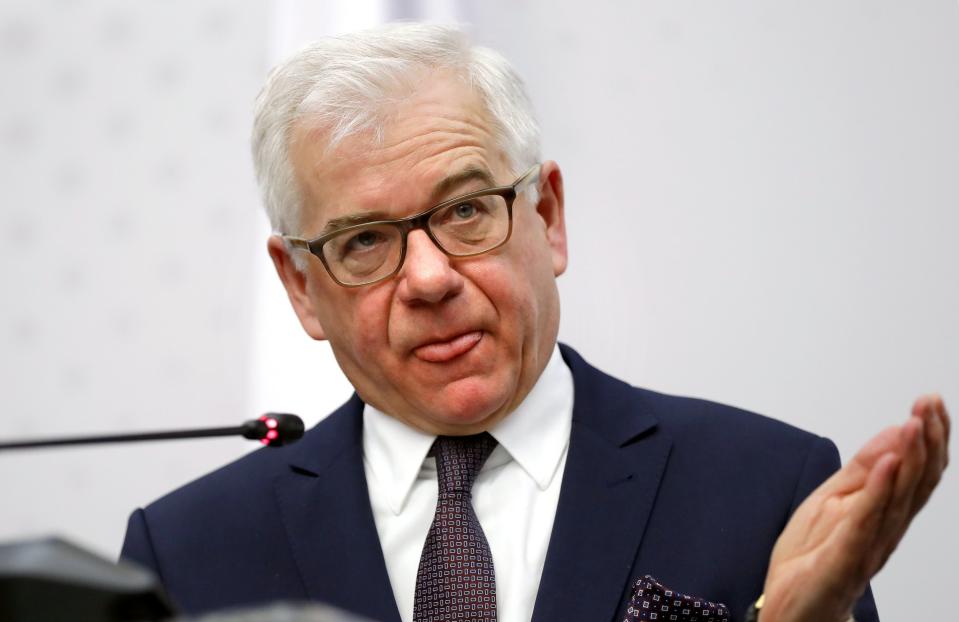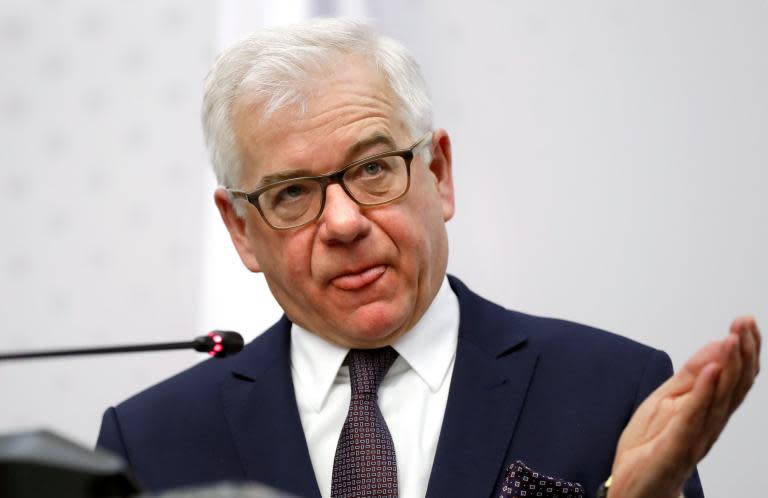Brexit: Poland breaks ranks from other EU countries to suggest time-limit on Irish backstop to satisfy Tory rebels
The Polish government has broken ranks from other EU member states and suggested giving in to Theresa May’s demand for a time-limit on the controversial Brexit backstop.
But foreign minister Jacek Czaputowicz was immediately contradicted by EU chief negotiator Michel Barnier and the Irish government, who ruled out any renegotiation of the withdrawal agreement.
Arriving in Brussels for a meeting on Monday, Mr Czaputowicz suggested a time-limit of five years on the policy – meeting demands of Tory Brexiteers.
“If Ireland appealed to the EU to change the agreement on the backstop in the agreement with the British so that it would apply temporarily, let’s say five years, the matter would be solved,” he told Polish newspaper Rzeczpospolita.
“Of course, this would be less beneficial for Ireland than an indefinite backstop, but much more favourable than the no-deal Brexit, which inevitably approaches.”
He said the EU and UK were locked in “a game of a chicken”, likening the situation to “two cars running at each other” ahead of a “frontal collision”.
The BBC reports that Mr Czaputowicz proposed a five-year time limit to his counterparts and has raised the issue with Irish foreign minister Simon Coveney and UK foreign secretary Jeremy Hunt. He added: “I don’t know if it’s feasible”, but said it would “unblock negotiations”.
The intervention is at odds with the publicly expressed views of other EU member states, who have said they will stand by Ireland’s demand that there can be no time-limit on the backstop – and that the withdrawal agreement is not open for renegotiation.
Following the comments, Mr Coveney said he believed the Polish foreign minister was trying to be “helpful” but that they did not reflect EU thinking.
“Everyone is saying the same thing: we can’t reopen the withdrawal agreement,” he told reporters in Brussels.
Mr Barnier meanwhile reiterated his line that the withdrawal agreement was “the best possible” deal and said any future talks could only be focused on negotiating a “more ambitious” future relationship – such as a customs union or single market. The comments effectively pre-empted a statement by Ms May in Westminster that afternoon in which she suggested she would try and secure changes to the backstop.
“The withdrawal agreement, with all its dimensions, including the backstop, is the best deal possible. This debate is much more now on the future relationship. As I said last week at the EU parliament, if the UK want to be more ambitious, we are ready to be,” Mr Barnier told Irish broadcaster RTE.
“It is now for the UK leaders to build a stable and positive majority for a deal. We are waiting for the next steps from the UK government but we are ready to work again on the political declaration.”
The Northern Ireland backstop, part of the Brexit withdrawal agreement, keeps the UK inside the EU’s customs territory to prevent a hard border with the Republic of Ireland.
Eurosceptics fear the policy would keep Britain tied to Brussels’ orbit indefinitely, and attempts at “clarification” by Brussels and the prime minister to convince them otherwise have so far been met with failure.
Other EU member states have yet to echo Poland’s conversion. Peter Altmaier, a senior German politician and close ally of Angela Merkel, said on Monday morning that “sympathy, patience and readiness to wait until the UK’s position is clarified are of utmost importance to avoid the worst”.
He added that a “large majority wants to exclude a hard Brexit – in the interest of the UK and beyond”.
Arriving at the Foreign Affairs Council meeting, Austrian foreign minister Karin Kneissl said: “This is the text we all invested ourselves in.”
A European Commission spokesperson said on Monday afternoon: “I’m not going to speculate on any possible outcomes, or any possible announcements. I’m not going to comment on the many declarations that we saw during the weekend. I’m not going to say anything on the many articles and reporters alleging this, or alleging that.
“The only thing I have to say is don’t look for answers to Brussels. As I’ve told you in the past, this is the moment for London to speak – not for us.”
He added that it was “absolutely correct” to say the the backstop was non-negotiable.


